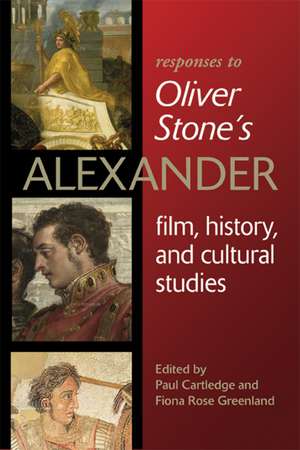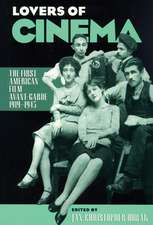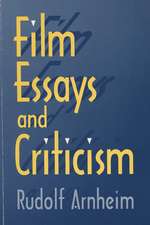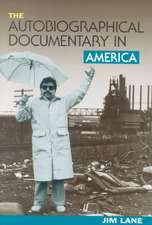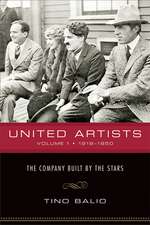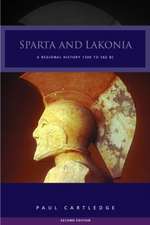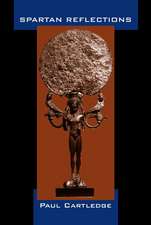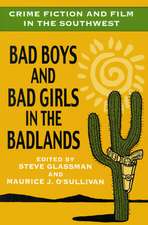Responses to Oliver Stone’s Alexander: Film, History, and Cultural Studies: Wisconsin Studies in Classics
Editat de Paul Cartledge, Fiona Rose Greenland Cuvânt după de Oliver Stoneen Limba Engleză Paperback – 19 ian 2010
The charismatic Alexander the Great of Macedon (356–323 B.C.E.) was one of the most successful military commanders in history, conquering Asia Minor, Egypt, Persia, central Asia, and the lands beyond as far as Pakistan and India. Alexander has been, over the course of two millennia since his death at the age of thirty-two, the central figure in histories, legends, songs, novels, biographies, and, most recently, films. In 2004 director Oliver Stone’s epic film Alexander generated a renewed interest in Alexander the Great and his companions, surroundings, and accomplishments, but the critical response to the film offers a fascinating lesson in the contentious dialogue between historiography and modern entertainment.
This volume brings together an intriguing mix of leading scholars in Macedonian and Greek history, Persian culture, film studies, classical literature, and archaeology—including some who were advisors for the film—and includes an afterword by Oliver Stone discussing the challenges he faced in putting Alexander’s life on the big screen. The contributors scrutinize Stone’s project from its inception and design to its production and reception, considering such questions as: Can a film about Alexander (and similar figures from history) be both entertaining and historically sound? How do the goals of screenwriters and directors differ from those of historians? How do Alexander’s personal relationships—with his mother Olympias, his wife Roxane, his lover Hephaistion, and others—affect modern perceptions of Alexander? Several of the contributors also explore reasons behind the film’s tepid response at the box office and subsequent controversies.
This volume brings together an intriguing mix of leading scholars in Macedonian and Greek history, Persian culture, film studies, classical literature, and archaeology—including some who were advisors for the film—and includes an afterword by Oliver Stone discussing the challenges he faced in putting Alexander’s life on the big screen. The contributors scrutinize Stone’s project from its inception and design to its production and reception, considering such questions as: Can a film about Alexander (and similar figures from history) be both entertaining and historically sound? How do the goals of screenwriters and directors differ from those of historians? How do Alexander’s personal relationships—with his mother Olympias, his wife Roxane, his lover Hephaistion, and others—affect modern perceptions of Alexander? Several of the contributors also explore reasons behind the film’s tepid response at the box office and subsequent controversies.
Din seria Wisconsin Studies in Classics
-
 Preț: 71.93 lei
Preț: 71.93 lei -
 Preț: 357.07 lei
Preț: 357.07 lei -
 Preț: 321.58 lei
Preț: 321.58 lei -
 Preț: 116.93 lei
Preț: 116.93 lei -
 Preț: 58.57 lei
Preț: 58.57 lei -
 Preț: 208.26 lei
Preț: 208.26 lei -
 Preț: 238.93 lei
Preț: 238.93 lei -
 Preț: 322.99 lei
Preț: 322.99 lei -
 Preț: 403.33 lei
Preț: 403.33 lei -
 Preț: 149.95 lei
Preț: 149.95 lei -
 Preț: 66.23 lei
Preț: 66.23 lei -
 Preț: 118.67 lei
Preț: 118.67 lei -
 Preț: 306.60 lei
Preț: 306.60 lei -
 Preț: 229.03 lei
Preț: 229.03 lei -
 Preț: 310.57 lei
Preț: 310.57 lei -
 Preț: 336.39 lei
Preț: 336.39 lei -
 Preț: 258.86 lei
Preț: 258.86 lei -
 Preț: 153.95 lei
Preț: 153.95 lei -
 Preț: 428.40 lei
Preț: 428.40 lei -
 Preț: 429.75 lei
Preț: 429.75 lei -
 Preț: 227.80 lei
Preț: 227.80 lei -
 Preț: 506.04 lei
Preț: 506.04 lei - 15%
 Preț: 478.78 lei
Preț: 478.78 lei -
 Preț: 247.73 lei
Preț: 247.73 lei -
 Preț: 402.76 lei
Preț: 402.76 lei - 15%
 Preț: 476.54 lei
Preț: 476.54 lei -
 Preț: 178.13 lei
Preț: 178.13 lei -
 Preț: 257.29 lei
Preț: 257.29 lei -
 Preț: 119.03 lei
Preț: 119.03 lei -
 Preț: 166.72 lei
Preț: 166.72 lei -
 Preț: 187.37 lei
Preț: 187.37 lei -
 Preț: 199.67 lei
Preț: 199.67 lei -
 Preț: 218.12 lei
Preț: 218.12 lei - 23%
 Preț: 608.98 lei
Preț: 608.98 lei - 23%
 Preț: 589.87 lei
Preț: 589.87 lei -
 Preț: 347.37 lei
Preț: 347.37 lei -
 Preț: 305.89 lei
Preț: 305.89 lei -
 Preț: 122.89 lei
Preț: 122.89 lei -
 Preț: 177.37 lei
Preț: 177.37 lei - 23%
 Preț: 591.20 lei
Preț: 591.20 lei -
 Preț: 160.48 lei
Preț: 160.48 lei -
 Preț: 258.14 lei
Preț: 258.14 lei -
 Preț: 258.25 lei
Preț: 258.25 lei - 23%
 Preț: 450.63 lei
Preț: 450.63 lei - 23%
 Preț: 709.57 lei
Preț: 709.57 lei -
 Preț: 502.03 lei
Preț: 502.03 lei -
 Preț: 246.80 lei
Preț: 246.80 lei
Preț: 160.09 lei
Nou
Puncte Express: 240
Preț estimativ în valută:
30.63€ • 31.98$ • 25.35£
30.63€ • 31.98$ • 25.35£
Carte disponibilă
Livrare economică 15-29 martie
Preluare comenzi: 021 569.72.76
Specificații
ISBN-13: 9780299232849
ISBN-10: 0299232840
Pagini: 384
Ilustrații: 17 b/w illus.
Dimensiuni: 152 x 229 x 25 mm
Greutate: 0.52 kg
Ediția:1
Editura: University of Wisconsin Press
Colecția University of Wisconsin Press
Seria Wisconsin Studies in Classics
ISBN-10: 0299232840
Pagini: 384
Ilustrații: 17 b/w illus.
Dimensiuni: 152 x 229 x 25 mm
Greutate: 0.52 kg
Ediția:1
Editura: University of Wisconsin Press
Colecția University of Wisconsin Press
Seria Wisconsin Studies in Classics
Recenzii
“A very successful contribution to the burgeoning subsector of classical scholarship dealing with the modern cinematic treatment of the classics.”—James S. Romm, editor of Alexander the Great: Selections from Diodorus, Plutarch, Quintus Curtius, and Arrian
“Responses to Oliver Stone’s Alexander achieves its mission of raising important questions about Alexander’s life and career as triggered by Stone’s film. The editors are to be commended for choosing a variety of scholars representing a variety of disciplines and positions, and certainly for securing an Afterword that reveals Stone’s continuing fascination and intellectual engagement with the subject. As a paperback original, this book is affordable enough for course usage and would make fine student reading.”—Sheramy D. Bundrick, Bryn Mawr Classical Review
“Rigorously researched, often brilliantly argued essays by scholars of the ancient world”—Tony Pipolo, Cineaste
Notă biografică
Paul Cartledge is the A.G. Leventis Professor of Greek culture in the Faculty of Classics, Cambridge University, and the Hellenic Parliament Global Distinguished Professor at New York University. He is author, coauthor, editor, or coeditor of more than twenty books, including Alexander the Great: The Hunt for a New Past. Fiona Rose Greenland earned a doctorate in classical archaeology as a Rhodes Scholar at the University of Oxford, where she subsequently served as lecturer. She was hired by Oliver Stone in 2003 to provide expertise on Greek art and architecture for Alexander. She is currently pursuing a doctorate in sociology at the University of Michigan.
Cuprins
Acknowledgments
Introduction
Paul Cartledge and Fiona Rose Greenland
Part 1. Stone's Alexander
Oliver Stone's Alexander and the Cinematic Epic Tradition
Joanna Paul
The Popular Reception of Alexander
Jon Solomon
Part 2. Precursors of Alexander
Alexander on Stage: A Critical Appraisal of Rattigan's Adventure Story
Robin Lane Fox
The Appearance of History: Robert Rossen's Alexander the Great
Kim Shahabudin
Part 3. Alexander's Intimates: Sexuality and Gender
Alexander and Ancient Greek Sexuality: Some Theoretical Considerations
Marilyn B. Skinner
Olympias and Oliver: Sex, Sexual Stereotyping, and Women in Oliver Stone's Alexander
Elizabeth D. Carney
Fortune Favors the Blond: Colin Farrell in Alexander
Monica S. Cyrino
The Cult of Hephaestion
Jeanne Reames
Part 4. Alexander's Dream: Macedonians and Foreigners
Oliver Stone, Alexander, and the Unity of Mankind
Thomas Harrison
"Help me, Aphrodite!" Depicting the Royal Women of Persia in Alexander
Lloyd Llewellyn-Jones
Part 5. Ways of Viewing Alexander
Viewing the Past: Cinematic Exegesis in the Caverns of Macedonia
Verity Platt
Blockbuster! Museum Responses to Alexander
John F. Cherry
Afterword
Oliver Stone
Index
Introduction
Paul Cartledge and Fiona Rose Greenland
Part 1. Stone's Alexander
Oliver Stone's Alexander and the Cinematic Epic Tradition
Joanna Paul
The Popular Reception of Alexander
Jon Solomon
Part 2. Precursors of Alexander
Alexander on Stage: A Critical Appraisal of Rattigan's Adventure Story
Robin Lane Fox
The Appearance of History: Robert Rossen's Alexander the Great
Kim Shahabudin
Part 3. Alexander's Intimates: Sexuality and Gender
Alexander and Ancient Greek Sexuality: Some Theoretical Considerations
Marilyn B. Skinner
Olympias and Oliver: Sex, Sexual Stereotyping, and Women in Oliver Stone's Alexander
Elizabeth D. Carney
Fortune Favors the Blond: Colin Farrell in Alexander
Monica S. Cyrino
The Cult of Hephaestion
Jeanne Reames
Part 4. Alexander's Dream: Macedonians and Foreigners
Oliver Stone, Alexander, and the Unity of Mankind
Thomas Harrison
"Help me, Aphrodite!" Depicting the Royal Women of Persia in Alexander
Lloyd Llewellyn-Jones
Part 5. Ways of Viewing Alexander
Viewing the Past: Cinematic Exegesis in the Caverns of Macedonia
Verity Platt
Blockbuster! Museum Responses to Alexander
John F. Cherry
Afterword
Oliver Stone
Index
Descriere
The charismatic Alexander the Great of Macedon (356–323 B.C.E.) was one of the most successful military commanders in history, conquering Asia Minor, Egypt, Persia, central Asia, and the lands beyond as far as Pakistan and India. Alexander has been, over the course of two millennia since his death at the age of thirty-two, the central figure in histories, legends, songs, novels, biographies, and, most recently, films. In 2004 director Oliver Stone’s epic film Alexander generated a renewed interest in Alexander the Great and his companions, surroundings, and accomplishments, but the critical response to the film offers a fascinating lesson in the contentious dialogue between historiography and modern entertainment.
This volume brings together an intriguing mix of leading scholars in Macedonian and Greek history, Persian culture, film studies, classical literature, and archaeology—including some who were advisors for the film—and includes an afterword by Oliver Stone discussing the challenges he faced in putting Alexander’s life on the big screen. The contributors scrutinize Stone’s project from its inception and design to its production and reception, considering such questions as: Can a film about Alexander (and similar figures from history) be both entertaining and historically sound? How do the goals of screenwriters and directors differ from those of historians? How do Alexander’s personal relationships—with his mother Olympias, his wife Roxane, his lover Hephaistion, and others—affect modern perceptions of Alexander? Several of the contributors also explore reasons behind the film’s tepid response at the box office and subsequent controversies.
This volume brings together an intriguing mix of leading scholars in Macedonian and Greek history, Persian culture, film studies, classical literature, and archaeology—including some who were advisors for the film—and includes an afterword by Oliver Stone discussing the challenges he faced in putting Alexander’s life on the big screen. The contributors scrutinize Stone’s project from its inception and design to its production and reception, considering such questions as: Can a film about Alexander (and similar figures from history) be both entertaining and historically sound? How do the goals of screenwriters and directors differ from those of historians? How do Alexander’s personal relationships—with his mother Olympias, his wife Roxane, his lover Hephaistion, and others—affect modern perceptions of Alexander? Several of the contributors also explore reasons behind the film’s tepid response at the box office and subsequent controversies.
